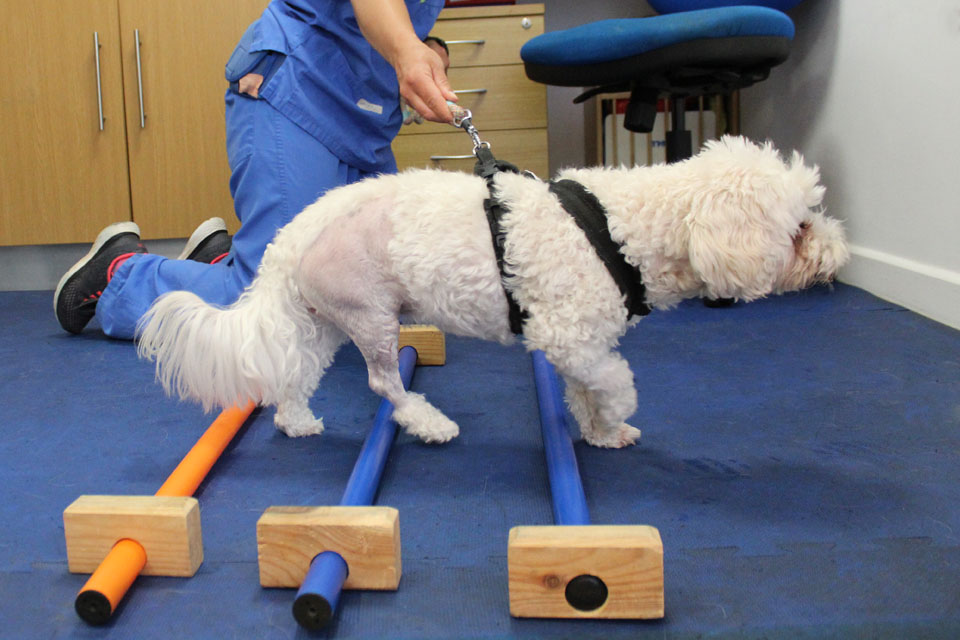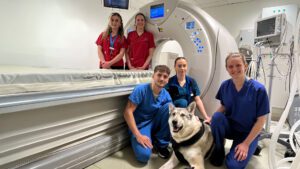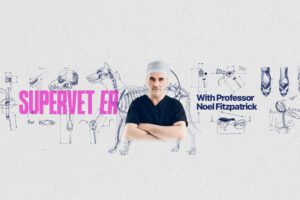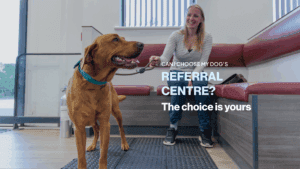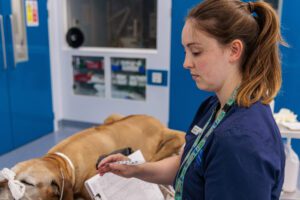Here at Fitzpatrick Referrals, we’re fortunate to have our very own rehabilitation centre, with an experienced team of ACPAT chartered physiotherapists dedicated to supporting the recovery and overall health of our patients.
The physiotherapy team work alongside our hydrotherapists and orthopaedic and neurology clinicians, to help animals referred to us achieve the optimum outcome.
Chartered Physiotherapist and Head of Rehabilitation Fiona Doubleday has answered some frequently asked questions to help you understand more about their profession and how it can help your animal friends.
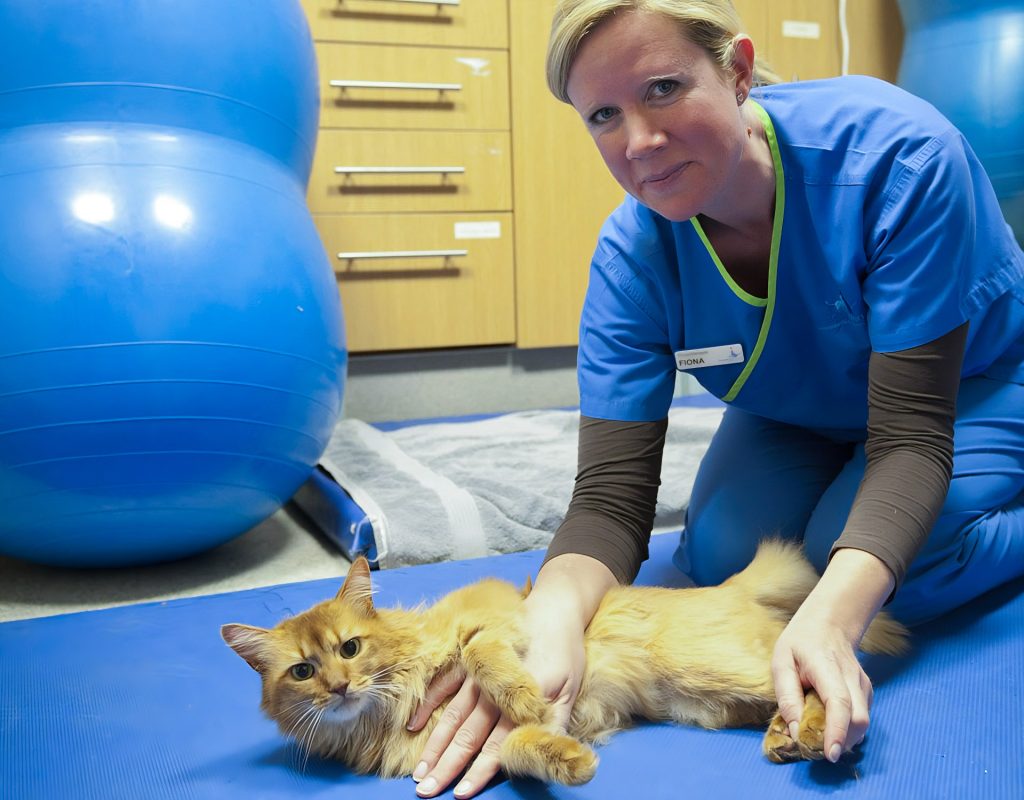
What is physiotherapy?
- Physiotherapy helps restore movement and function when an animal is affected by injury, illness or disability through movement and exercise, manual therapy, education and advice.
- Physiotherapy maintains health for animals of all ages, helping patients to manage pain and prevent disease. The profession also helps to encourage development and facilitate recovery.
How can physiotherapists help?
Our physiotherapists use their specialist assessment skills to help identify areas of dysfunction, weakness and/or impairment.
- Alleviate pain
- Reduce swelling
- Optimise healing conditions
- Muscle strengthening
- Increase range of movement and reduce stiffness
- Increase soft tissue flexibility and reduce tightness/spasm
- Prehab – prehabilitation can help improve your animal’s post-surgical outcome.
- Improve proprioception – coordination, balance and awareness
- Slow disease progression
- Optimise and normalise gait patterning
- Restore movement and function
- Empower clients to look after their animals through education and advice
- Advise regarding further treatment options such as hydrotherapy or acupuncture (subject to veterinary consent)
- Liaise closely with your vet to optimise treatment
- Improve quality of life!
What treatment options do our physiotherapists offer?
Patients will often benefit from multiple treatment options to optimise recovery and function!
- Manual therapy including joint mobilisations and manipulation
- Soft tissue techniques including massage and myofascial release
- Exercise therapy and prescription
- Electrotherapy including laser, muscle stim (NMES), TENS
- Chest physiotherapy
- Splinting – both premade and custom
- Education and advice
- Lifestyle management – both short and long term
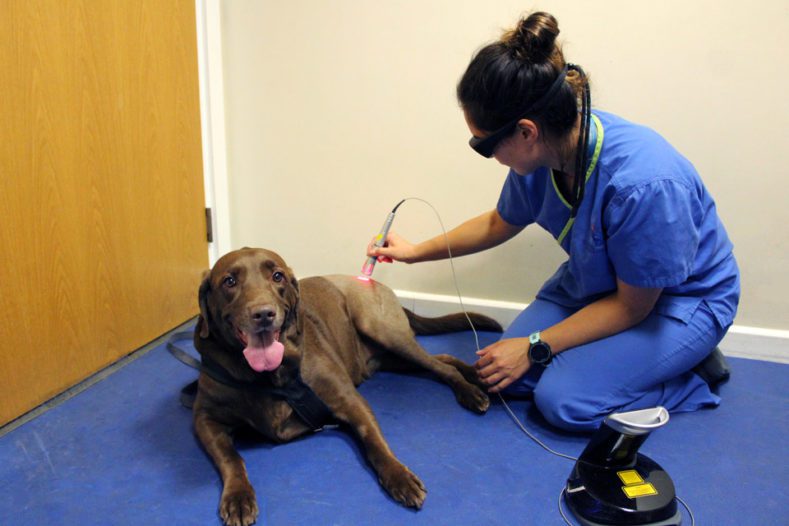
Who can benefit from physiotherapy?
Any animal with a dysfunction, asymmetry, pain, lameness, stiffness or muscle loss to name but a few!
- Pre-surgery animals
- Post-surgery animals
- Older animals
- Young animals
- Sports dogs
- Obese animals
What conditions do the physiotherapy team at Fitzpatrick Referrals help treat?
- Conservatively managed conditions – patella luxation, arthritis, joint laxity, IVDD
- Pre and post-orthopaedic and neurological surgery e.g. joint replacements, arthroscopy, TPLO, hemilaminectomy, fracture repair, patella luxation
- Neurological conditions (both surgical and non-surgical management) e.g. degenerative myopathy, interverbal disc disease, vestibular dysfunction, lumbosacral stenosis
- Osteoarthritis and joint pain/dysfunction, as well as other types of arthritis
- Mobility and function maintenance of the older dog
- Back and neck pain, as well as general pain management
- Dysplasia such as hip or elbow
- Muscle, tendon and ligament strains and sprains
- Amputees
- Performance problems
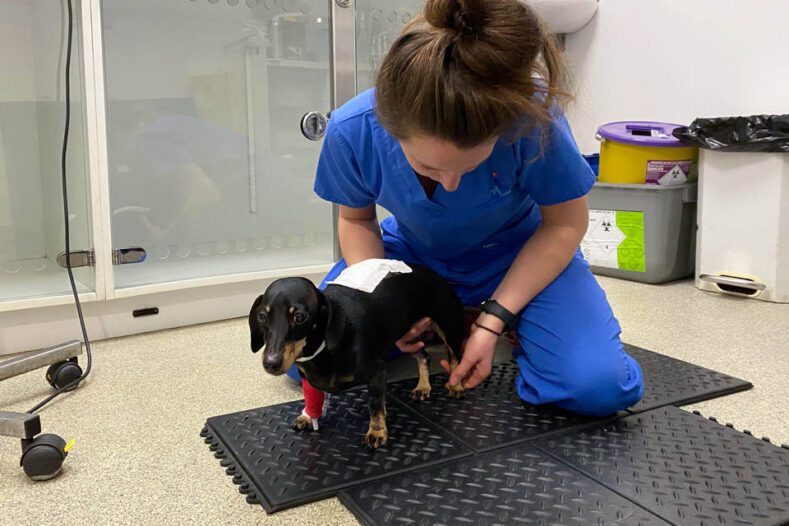
What are some of the signs that may indicate your animal could benefit from physiotherapy?
- Lameness
- Stiffness on rising/after rest
- Muscle loss
- Slowing down/slower walking/ stumbling
- Reluctance or hesitating to jump on/off furniture/car
- Behavioural changes such as more aggression, excessive licking particular areas, pacing, dog reactivity
- Reluctance to play/exercise
- Abnormal movements or postures – arched back, tremors, reduced coordination
- Joint abnormalities such as clicking, swelling, heat
- Quiet, withdrawn, depressed
- Abnormal wearing of claws
- Low head carriage
- Inappetite
We hope this has helped you understand more about animal physiotherapy and empowers you to recognise when it may be beneficial for your dog or cat.
Book an appointment
To book your first appointment, your primary care vet will need to send us a referral, following which, one of our team will contact you to arrange the appointment.
Read more about our physiotherapy service
4 minute read
In this article
